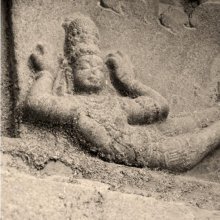Kshipta, Kṣipta: 19 definitions
Introduction:
Kshipta means something in Buddhism, Pali, Hinduism, Sanskrit, Marathi, Hindi. If you want to know the exact meaning, history, etymology or English translation of this term then check out the descriptions on this page. Add your comment or reference to a book if you want to contribute to this summary article.
The Sanskrit term Kṣipta can be transliterated into English as Ksipta or Kshipta, using the IAST transliteration scheme (?).
Alternative spellings of this word include Kshipt.
Images (photo gallery)
(+5 more images available)
In Hinduism
Natyashastra (theatrics and dramaturgy)
Source: Wisdom Library: Nāṭya-śāstraKṣipta (क्षिप्त, “thrown out”) refers to a specific gesture (āṅgika) made with the shank (jaṅghā), according to the Nāṭyaśāstra chapter 10. These gestures form a part of the histrionic representation (abhinaya).
Source: archive.org: Natya ShastraKṣipta (क्षिप्त, “thrown out”).—A type of gesture (āṅgika) made with the shank (jaṅghā);—Instructions: shank thrown out. Uses: in the exercise [of limbs] and the Class Dance.

Natyashastra (नाट्यशास्त्र, nāṭyaśāstra) refers to both the ancient Indian tradition (shastra) of performing arts, (natya—theatrics, drama, dance, music), as well as the name of a Sanskrit work dealing with these subjects. It also teaches the rules for composing Dramatic plays (nataka), construction and performance of Theater, and Poetic works (kavya).
Ayurveda (science of life)
Source: gurumukhi.ru: Ayurveda glossary of termsKṣipta (क्षिप्त):—[kṣiptam] Adding some excipients to increase palatability

Āyurveda (आयुर्वेद, ayurveda) is a branch of Indian science dealing with medicine, herbalism, taxology, anatomy, surgery, alchemy and related topics. Traditional practice of Āyurveda in ancient India dates back to at least the first millenium BC. Literature is commonly written in Sanskrit using various poetic metres.
Jyotisha (astronomy and astrology)
Source: Wisdom Library: Brihat Samhita by VarahamihiraKṣipta (क्षिप्त) refers to “scattered”, according to the Bṛhatsaṃhitā (chapter 12), an encyclopedic Sanskrit work written by Varāhamihira mainly focusing on the science of ancient Indian astronomy astronomy (Jyotiṣa).—Accordingly, “The mighty ocean whose waters were swallowed by Agastya, exhibited gems that eclipsed the splendour of the crowns of the Devas [...] It exhibited whales, water elephants, rivers and gems scattered [i.e., kṣipta] over its bed, and, though deprived of water, presented an appearance splendid as Devaloka. There were also seen, moving to and fro, whales, pearl oysters and conch shells, and the sea altogether looked like a summer lake with its moving waves, water lilies and swans”.

Jyotisha (ज्योतिष, jyotiṣa or jyotish) refers to ‘astronomy’ or “Vedic astrology” and represents the fifth of the six Vedangas (additional sciences to be studied along with the Vedas). Jyotisha concerns itself with the study and prediction of the movements of celestial bodies, in order to calculate the auspicious time for rituals and ceremonies.
Shaktism (Shakta philosophy)
Source: Google Books: ManthanabhairavatantramKṣipta (क्षिप्त) refers to “being thrown (into the sea)”, according to verse 11.39-45 of the Kularatnoddyota, one of the earliest Kubjikā Tantras.—Accordingly, “O beloved, there will be a great Siddha in (the fish’s) belly born of the vitality of the Command and he will, O Mahāmāyā, practice the (teaching of) that scripture by himself. That scripture was thrown (kṣipta) into the sea by (the goddess’s) son by means of the Yoga of Knowledge . [...]”.

Shakta (शाक्त, śākta) or Shaktism (śāktism) represents a tradition of Hinduism where the Goddess (Devi) is revered and worshipped. Shakta literature includes a range of scriptures, including various Agamas and Tantras, although its roots may be traced back to the Vedas.
Yoga (school of philosophy)
Source: ORA: Amanaska (king of all yogas): A Critical Edition and Annotated Translation by Jason BirchKṣipta (क्षिप्त) refers to “pouring (water)”, according to the Kulārṇavatantra (verse 9.15, 17).—Accordingly: “Just as water poured (kṣipta) into water, milk into milk and ghee into ghee, so there is no distinction between the individual self and the supreme self”.

Yoga is originally considered a branch of Hindu philosophy (astika), but both ancient and modern Yoga combine the physical, mental and spiritual. Yoga teaches various physical techniques also known as āsanas (postures), used for various purposes (eg., meditation, contemplation, relaxation).
In Buddhism
Mahayana (major branch of Buddhism)
Source: De Gruyter: A Buddhist Ritual Manual on AgricultureKṣipta (क्षिप्त) refers to “throwing (mustard seeds) (into the water)” (as part of an worship ceremony), according to the Vajratuṇḍasamayakalparāja, an ancient Buddhist ritual manual on agriculture from the 5th-century (or earlier), containing various instructions for the Sangha to provide agriculture-related services to laypeople including rain-making, weather control and crop protection.—Accordingly [after Sāgara taught the Nāga-vow mantra], “Worship should be made with flowers, incense and fragrances. Incense should be offered in the four directions. All Nāgas should be impelled. Having enchanted the bathing water eighty times, and having thrown mustard seeds into it, it should be thrown in the middle of the residence. Merely upon throwing it (saha-kṣipta-mātra) into the water, the residence of the Nāgas immediately rumbles. [...]”.

Mahayana (महायान, mahāyāna) is a major branch of Buddhism focusing on the path of a Bodhisattva (spiritual aspirants/ enlightened beings). Extant literature is vast and primarely composed in the Sanskrit language. There are many sūtras of which some of the earliest are the various Prajñāpāramitā sūtras.
Languages of India and abroad
Marathi-English dictionary
Source: DDSA: The Molesworth Marathi and English Dictionarykṣipta (क्षिप्त).—p S Thrown or cast. 2 fig. Aspersed.
Source: DDSA: The Aryabhusan school dictionary, Marathi-Englishkṣipta (क्षिप्त).—p Thrown or cast. Fig. Aspersed.
Marathi is an Indo-European language having over 70 million native speakers people in (predominantly) Maharashtra India. Marathi, like many other Indo-Aryan languages, evolved from early forms of Prakrit, which itself is a subset of Sanskrit, one of the most ancient languages of the world.
Sanskrit dictionary
Source: DDSA: The practical Sanskrit-English dictionaryKṣipta (क्षिप्त).—p. p. [kṣip-kta]
1) Thrown, scattered, hurled, cast; क्षिप्ता जूर्णिर्न वक्षति (kṣiptā jūrṇirna vakṣati) Ṛgveda 1.129.8.
2) Abandoned.
3) Disregarded, neglected, disrespected.
4) Placed.
5) Distracted, mad (see kṣip).
-ptā Night.
-ptam A wound caused by shooting; अथो क्षिप्तस्य भेषजीम् (atho kṣiptasya bheṣajīm) Av.6. 19.3.
Source: Cologne Digital Sanskrit Dictionaries: Shabda-Sagara Sanskrit-English DictionaryKṣipta (क्षिप्त).—mfn.
(-ptaḥ-ptā-ptaṃ) 1. Thrown, cast. 2. Sent, despatched 3. Dismissed. f.
(-ptā) Night; also kṣipā and kṣapā E. kṣip to throw, &c. affix kta.
Source: Cologne Digital Sanskrit Dictionaries: Cappeller Sanskrit-English DictionaryKṣipta (क्षिप्त).—[adjective] thrown, tossed, hit, afflicted; defamed, despicable; [neuter] a wound caused by shooting or throwing.
Source: Cologne Digital Sanskrit Dictionaries: Monier-Williams Sanskrit-English Dictionary1) Kṣipta (क्षिप्त):—[from kṣip] mfn. thrown, cast, sent, despatched, dismissed, [Ṛg-veda i, 129, 8; Mahābhārata] etc.
2) [v.s. ...] reviled, despicable (on account of [instrumental case] or -tas), [Pāṇini 5-4, 46; Kāśikā-vṛtti]
3) Kṣiptā (क्षिप्ता):—[from kṣipta > kṣip] f. (for kṣapā) night, [cf. Lexicographers, esp. such as amarasiṃha, halāyudha, hemacandra, etc.]
4) Kṣipta (क्षिप्त):—[from kṣip] n. a wound caused by shooting or throwing, [Atharva-veda vi, 109, 3]
5) [v.s. ...] ‘scattered’, distraction or absence of mind, [Sarvadarśana-saṃgraha]
Source: Cologne Digital Sanskrit Dictionaries: Yates Sanskrit-English DictionaryKṣipta (क्षिप्त):—[(ptaḥ-ptā-ptaṃ) a.] Thrown. f. Night.
Source: DDSA: Paia-sadda-mahannavo; a comprehensive Prakrit Hindi dictionary (S)Kṣipta (क्षिप्त) in the Sanskrit language is related to the Prakrit words: Aḍḍakkhiya, Khitta, Khiviya, Ghattiya, Chūḍha, Pillia.
[Sanskrit to German]
Sanskrit, also spelled संस्कृतम् (saṃskṛtam), is an ancient language of India commonly seen as the grandmother of the Indo-European language family (even English!). Closely allied with Prakrit and Pali, Sanskrit is more exhaustive in both grammar and terms and has the most extensive collection of literature in the world, greatly surpassing its sister-languages Greek and Latin.
Hindi dictionary
Source: DDSA: A practical Hindi-English dictionaryKṣipta (क्षिप्त) [Also spelled kshipt]:—(a) thrown, projected; interpolated; ~[ptāṃśa] interpolation, interpolated text.
...
Kannada-English dictionary
Source: Alar: Kannada-English corpusKṣipta (ಕ್ಷಿಪ್ತ):—
1) [adjective] thrown, hurl forward or up; projected.
2) [adjective] fired, launched (toward a target, as a missile).
3) [adjective] sent; despatched.
4) [adjective] spread or diffused throughout; pervaded.
--- OR ---
Kṣipta (ಕ್ಷಿಪ್ತ):—
1) [noun] the act of throwing, hurling, projecting (up, toward or away).
2) [noun] the state of mind that is attached to the worldly affairs (as opp. to spiritual end).
Kannada is a Dravidian language (as opposed to the Indo-European language family) mainly spoken in the southwestern region of India.
See also (Relevant definitions)
Starts with: Kshiptabheshaja, Kshiptachitta, Kshiptacitta, Kshiptadeha, Kshiptaka, Kshiptakukkara, Kshiptalaguda, Kshiptata, Kshiptavat, Kshiptayoni, Kshiptottara.
Ends with (+33): Abhikshipta, Abhisamkshipta, Abhisankshipta, Adhah-kshipta, Adhahkshipta, Adhikshipta, Akshipta, Anikshipta, Anuparikshipta, Anutkshipta, Apakshipta, Arthakshipta, Asamkshipta, Ati-kshipta, Atikshipta, Avakshipta, Avikshipta, Avyakshipta, Kanakalatakshipta, Madavikshipta.
Full-text (+81): Kshiptadeha, Kshiptacitta, Vikshipta, Nihkshipta, Adhikshipta, Pillia, Pratikshipta, Avakshipta, Vinikshipta, Khitta, Parikshipta, Prakshipta, Kshiptayoni, Nikshipta, Samkshipta, Tiryak-kshipta, Akshipta, Pratikshiptatva, Samkshiptabhashya, Samkshiptavedanta.
Relevant text
Search found 30 books and stories containing Kshipta, Kṣipta, Ksipta, Kṣiptā; (plurals include: Kshiptas, Kṣiptas, Ksiptas, Kṣiptās). You can also click to the full overview containing English textual excerpts. Below are direct links for the most relevant articles:
Sahitya-kaumudi by Baladeva Vidyabhushana (by Gaurapada Dāsa)
Text 4.35 < [Chapter 4 - First-rate Poetry]
Text 6.5 < [Chapter 6 - Third-rate Poetry and Super-excellent Poetry]
Text 4.87 < [Chapter 4 - First-rate Poetry]
Brihad Bhagavatamrita (commentary) (by Śrī Śrīmad Bhaktivedānta Nārāyana Gosvāmī Mahārāja)
Verse 2.4.237 < [Chapter 4 - Vaikuṇṭha (the spiritual world)]
Jainism and Patanjali Yoga (Comparative Study) (by Deepak bagadia)
Part 4.3 - Cittavrtti (Modifications of mind) < [Chapter 2 - Yoga philosophy and practices]
Part 5 - Spirituality in Yoga and Jainism < [Chapter 4 - A Comparative Study]
Sushruta Samhita, volume 2: Nidanasthana (by Kaviraj Kunja Lal Bhishagratna)
Bhakti-rasamrta-sindhu (by Śrīla Rūpa Gosvāmī)
Verse 4.7.11 < [Part 7 - Ghastliness (vībhatsa-rasa)]
Verse 3.4.66 < [Part 4 - Parenthood (vātsalya-rasa)]
Atharvaveda and Charaka Samhita (by Laxmi Maji)
Treatment of Kṣipta-roga < [Chapter 3 - Diseases and Remedial measures (described in Atharvaveda)]
Medicine in the Atharva-veda (Introduction) < [Chapter 3 - Diseases and Remedial measures (described in Atharvaveda)]
4b. Leprosy (Kuṣṭha) in the Caraka-saṃhitā < [Chapter 5 - Diseases and Remedies in Atharvaveda and Caraka-Saṃhitā]
Related products






